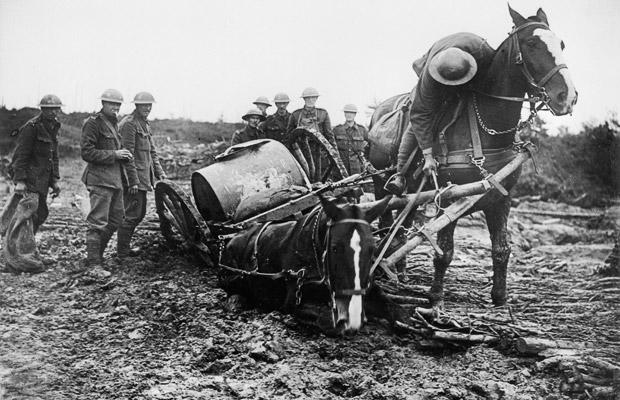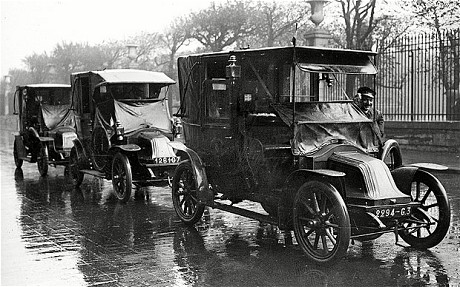
Fire and Movement
The British Expeditionary Force
And the Campaign of 1914
Peter Hart
(Oxford)

I've always been rather fond of World War One. It was certainly one of the dumbest conflagrations, fought for no good reason except to prove the blood-lust that hides itself in the soul of men, a people-eater machine that ran on or ran over vague or non-existent principals --- a conflagration astonishingly wasteful of human life, and all natural and manufactured and expensive resources.Alas, the only other wars we can compare it to are the Opium Wars (1839 - 1842 and 1856 - 1860), fought by Western Powers to insure that the Chinese market for the heaviest dope-trips of them all would never be closed down (it still isn't) and --- a near second --- the American Civil War fought, presumably, to put an end to slavery but it is now seen as a brawl initiated for economic reasons, assuring that the Northern States could cadge for themselves the huge import/export resources of the rural and highly productive (and largely unprotected) south --- resulting in their winning and immediately commandeering all assets that passed through the major Confederate ports.
But WWI had a second lethal bonus, the usual unintended consequences --- ones that changed forever the economic status of the parties that fomented it. That is, the war led directly and inevitably to the Great Depression. By killing off in five short years some sixty million of the best and the brightest young men of the world, it generated a missing (or "lost") generation of peoples who otherwise would have moved forward to the universal economic and social well-being so necessary for human progress.
The war itself wrecked the manufacturing infrastructure of eleven nations of Europe (and wrecked the economy of their colonies world-wide), and, at the same time, took the lives of ten million soldiers in the field. Which led to the second great unintended consequence to wriggle out of the War-bag. The conditions of fighting, trench warfare, rats, lice, men eating, living, sleeping and dying together in the most revolting conditions, complete with bodily decay, poisoning the very land, called rightly No Man's Land --- managed to foment a bacterial stew that between 1918 and 1920 produced the pandemic known as "The 'Flu."

No one will ever know for sure the mortality figures for this ultimate catastrophe, because it invaded towns and villages worldwide at a time when medical statistics for most places were non-existent. "In pockets across the globe, something erupted that seemed as benign as the common cold. The influenza of that season, however, was far more than a cold. In the two years that this scourge ravaged the earth, a fifth of the world's population was infected. The flu was most deadly for people ages 20 to 40. This pattern of morbidity was unusual for influenza which is usually a killer of the elderly and young children. It infected 28% of all Americans" Molly Billings reports.The influenza pandemic of 1918-1919 killed more people than the Great War . . . .at somewhere between 20 and 40 million people. It has been cited as the most devastating epidemic in recorded world history. More people died of influenza in a single year than in four-years of the Black Death (Bubonic Plague) from 1347 to 1351. Known as "Spanish Flu" or "La Grippe," the influenza of 1918-1919 was a global disaster.
One physician writes that patients with seemingly ordinary influenza would rapidly "develop the most viscous type of pneumonia that has ever been seen" and later when cyanosis appeared in the patients, "it is simply a struggle for air until they suffocate." Another physician recalls that the influenza patients "died struggling to clear their airways of a blood-tinged froth that sometimes gushed from their nose and mouth." The physicians of the time were helpless against this powerful agent of influenza. In 1918 children would skip rope to the rhyme
I had a little bird,
Its name was Enza.
I opened the window,
And in-flu-enza.One final unintended consequence: another slow-to-develop plague, a far-ranging disease-carrying bug called "World War II." Historians, no matter their political bent, agree that WWII was just a continuation of WWI. Yes, there was a rest, a hiatus, as it were, of twenty-one years . . . just long enough for the world to produce yet another crop of starry-eyed young men who, between 1939 and 1945, and with the exacting help of each other, managed to do in somewhere between 60,000,000 and 80,000,000 people.
§ § § With these figures in mind, it is interesting to dive into Peter Hart's book Fire and Movement. Here we are being given the chance to visit the first four or five months of the first in our series of "Great" wars. The young men of Europe --- specifically the kids of England, France and Germany --- came to be at home in the death-factory known as World War; were given a first chance to visit the New Bloodshed Reality Pie. In the easiest days of the war --- the fall of 1914 --- they would learn, quickly, what would become, over the next fifty years, The Norm: the commonplace for the hundreds of thousands of bright-eyed hope-filled young men resting, now, quietly, in what were once the playing-fields of Europe.
Europe had seen no major conflagration since the end of the Franco-Prussian War in 1871, and here was a chance for newly minted young men to play with a new weaponry, major new discoveries: the machine gun, flying bomb-machines, bayonets, flamethrowers, grenades (called Mills Bombs and Jam Pots), pistols, poison gas (first used by the French; later popularised by the Germans), rifles, tanks, trench mortars, and long-range cannon.
Fire and Movement is a sensational collection of letters, journals, articles, and memento mori --- written during the war by those who learned manslaughter at first hand. Because this was the first literate war (those who were participating were part of the new schooling that had swept Europe and the Americas in the last part of the 19th century), we get people who could read and write; they had the startling force to tell what they were living, and we get it all right here.
It was, with a new vocabulary, a war that could be described with a new vision. These men there on the ground were able to put into words the surprising goings on of a world suddenly turned mad, muddy, cold, brutal.
This is Medical Officer Captain Arthur Osburn, on 29 September 1914, in very early siege of WWI, that of Aisne, France, where the "low moaning sound" presaging the arrival of tons of ammunition, a whining scream "with a flash, a terrific detonation, the walls of the building shook, and the air was full of dust."
Fragments of stone, manure, pieces of clothing and hair came falling all about me as I ran through an archway into the yard and beheld one of the most heartrending sights I have ever seen, even in war. The detachment of the 9th Lancers has almost completely disappeared. In the centre of the yard there was now a mound four or five feet high of dead men and horses, all too obviously dead, yet still they were moving, men and horses twitching and sliding over one another with slow writhing movements, the men's faces purple, crimson or ash-grey. For a moment, rooted to the ground, I stared at this heap --- a moving mound of death. Then, from all sides of the yard, a chorus of screams, shouts, and groans. Around this central heap of dead men the wounded lay on all sides. Some had been blown to the other end of the yard, their backs broken. One sat up dazed and whimpering, his back against a wall holding part of his intestine in his hand. Those nearest to the heap were only moaning and writhing; it was those further off, comparatively speaking the least damaged yet terribly injured, who shouted and screamed in agony . . . One terribly wounded, lay with both legs partly torn away at the knee, one arm broken and other wounds; he was still conscious. "Oh! My God! Shoot me! Shoot me," he moaned. "Quick."
Imagine --- after forty-five years of quiescence, after summers of Edwardian peace, the lovely twilight and the gentle perfumes of the early fall, the trees shading the bucolic meadows, the carefully tended Queen Anne's lace, the perfume of jasmine and sweet spice, that lazy time of early fall with the sun laying its gentle hand on the vitiating day, benevolent moments of languid love in the valley, the coming of night and suddenly, a blast of the cannon, one that was to be repeated a thousand thousand times for the next four years --- every day and every day and every night every night. Such is the lust of the war dragon: once roused, he never wants to rest again.
§ § § It's a rare fat history book that catches you up and shakes you and won't let you go, but Fire and Movement is just that. To watch a whole generation suddenly become disabused, sometimes mournfully, sometimes comically. For instance, you are Captain of the 4th Dragoon Guards, and you have been retreating for days. Your men are tired, confused, have lost all hope. How do you bring them back to life?
"The resourceful and dynamic Bridges turned his attention to the dispirited rabble in the Grand Place."
The men in the square were so jaded it was pathetic to see them. If only one had a band, I thought! There was a toy shop handy which provided my trumpeter and myself with a tin whistle and a drum and we marched round and round the fountain where the men were lying like the dead, playing The British Grenadiers and Tipperary and beating the drum like mad. They sat up and began to laugh and even to cheer. I stopped playing and made them a short exhortation and told them I was going to take them back to their regiments.
The questions never stopped for these so new to this new thing called "war." How do you take a prisoner, a fellow in front of you with his hands in the air? How do you figure out where the enemy is when there are no radios or telephones about? What do you do to help your mate who has just had his shoulder blown off, or whose intestines are suddenly hanging out where they should not be, ever?
How do you hide in a little hole in the ground when the air is alive with bullets? How do you keep the rot from taking over your feet when you are standing in cold green-gray greasy mud for days at a time? How do you come to put up with days and nights and nights and days of explosions and whistlings and roarings and shrieking and cries from the dying in no man's land before you? How do you learn to live with all of that without end?These were the first men there at the first to have their vision of the world turned upside-down, to learn that their bodies --- all bodies --- are so very fragile, so ready to be reduced to the simplest of components: meat, blood, bone, gristle, brain, connective tissue --- the very juices of life revealed so quickly.
Read this one so you can know equally as quickly what it's like when innocence is shattered. The exact words of the graduating class telling us that all this seems to be --- against all logic --- perfectly logical.
That is, those in power have the power to send their young and gentle and innocent to ravage each other for four lean yet gargantuan years.
Leaving hope, and spirits, and caring everywhere mangled.
To death.
Everywhere.
--- Anna French